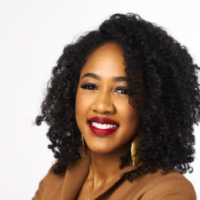
Sable Lomax, director of programmes and communications at Fearless Futures, told the latest executive meeting that plenty could be done to help improve representation and equality in the workplace and society, but it depended on systemic restructuring, not just pushing individuals into the spotlight.
She emphasised biases could not be undone without acknowledging the in-built privileges some people had been given, accepting what minority groups had been through in the past and the resulting long-lasting impacts.
Lomax (pictured) began the session asking a series of simple yet eye-opening questions related to undertaking typical daily life activities to help the audience understand what some people take for granted but can leave others in fear.
“How does it affect you if you always live in fear?” she asked, before highlighting that these situations had been woven into society for generations and by design.
“There are a few different ways with which you can address these long-term societal issues – be it sexism, racism, disablism, islamophobia, colonisalism, anti-semitism and so on,” Lomax said.
“There are lots of things we can do but we cannot ignore the history that explains how we got to a place where today we are not all starting at the same line.
“Imagine how it might feel – the diminishment of someone’s lived experience – if you walked up to them and just said, ‘ok we’re just going to level the playing field’. The ability to say that in and of itself is a privilege.”
‘It’s by design’
Being able to identify and understand that someone was in a position of privilege is the first step in addressing that situation.
“First you have to figure out what you don’t know,” Lomax said.
“Privileges are often invisible to those who have them. They are not only unearned advantages, but it’s by design – designed by laws, policies, practices, society and also within our workplace.
“How do we end up with institutions across society where senior leadership is not only male, but CIS white male, heterosexual, non-Jewish, non-Muslim, non-disabled white male?
“That’s not just happen chance, it’s by design.”
Within workplaces, it is important to identify who is given legitimacy, who belongs there and who is questioned.
“Thinking about colleagues and co-workers, who has the freedom to just breathe and be at any given moment?” Lomax added.
‘What am I missing?’
Workplace leaders should begin by asking themselves “What am I missing here?”, removing the lens of their identity and understanding how they can educate themselves better.
“So much of this is on learning,” Lomax continued. “Education is not the end all be all, if the education we are receiving is historically inaccurate or missing lots of things and the experiences of millions of people.”
“When we don’t understand a new concept or new thing, we’ll go to google and figure it out. But when it comes to all things inclusion all of a sudden the smartest of adults ask ‘What do I do?’”
Questions such as what are the ways sexism shows in the workplace? Or what are the ways black people are dehumanised in the workplace? can be the start of the learning process.
The manifestation of the criminalisation of black people can continue in the workplace without police involvement.
Examples such as increased security checks or by considering someone as aggressive when saying the same thing while someone else is considered passionate can all illustrate the in-built biases.
Lomax asked attendees to consider how they can educate themselves to ensure they are not perpetuating these systems in inter-personal behaviours and unlearn what they have been taught.
“You don’t just wake up one day and discover your privileges, this is a lifelong process,” she said.
“What you’ll begin to notice is many of these experiences are not homogenous at all.”
Addressing the question of ‘What about me?’ responses, Lomax said: “When privilege is invisible to those that have it, I expect the ‘What about me?’ argument, because you don’t realise the world has been designed for you.
‘It’s not about individuals, it’s the system’
Lomax concluded with the issue of relying on more people of minority groups getting into positions of power but not improving situations for others.
She noted that while visibility of under-represented groups could help, isolated representation alone would not solve the issue.
“Representation in roles of power is an important piece of addressing the issue, however you can absolutely have someone from these communities be in positions of power who perpetuates the status quo,” she said.
“If you’re in proximity to power, you don’t want to lose that power so you maintain the status quo, you protect that status quo, which is the issue with representations being the be all and end all to fix these things.”
Instead, the solutions came from re-writing the systems and structures within society.
“To get to a space where it’s not the end of the world where the one woman who makes it can ruin it for all women underneath her, is the idea that we have to redesign our policies, our practices, our laws, because that’s where these systems are perpetuated,” Lomax continued
“To make a place more equitable and inclusive, it’s not about the individual, it is about the system.
“If it was about the individual, when all the individuals passed away that created the system it would go away, but it’s so embedded and baked into the space, where one woman doesn’t have that big an impact, we have to look at why is only one woman there in the first place?
“That requires structural redesign, which is not easy.”
















